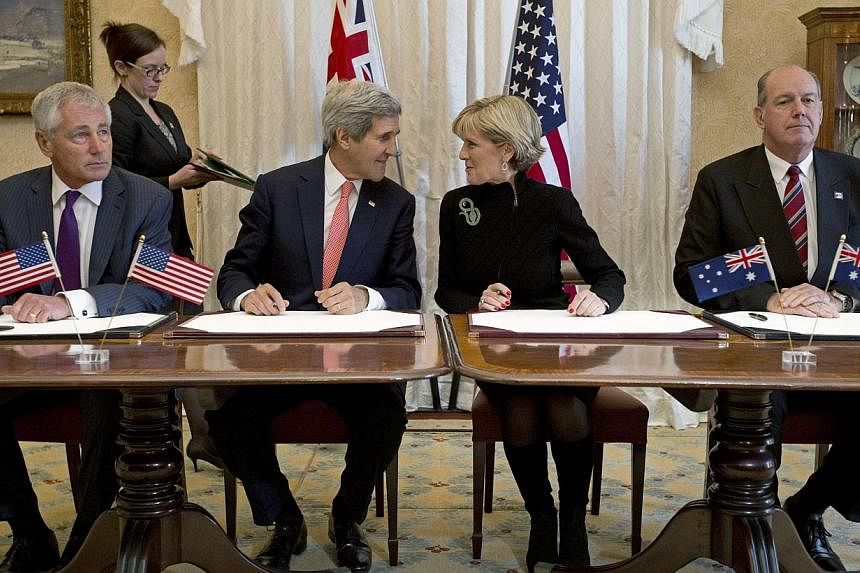SYDNEY (AFP) - Australia's Foreign Minister Julie Bishop on Tuesday defended a deal to deploy 2,500 US Marines in the country, denying it was aimed at curbing a rising China with tensions growing in the region.
Beijing bristled when the deal, to be signed off at annual security talks, was announced as part of the US "pivot" to Asia in 2011. But Bishop, who is hosting US Secretary of State John Kerry and Defence Secretary Chuck Hagel in Sydney, said the rotation of Marines into the northern city of Darwin was the "natural evolution" of their alliance.
"It's aimed at supporting the long-term peace, stability and prosperity of our region, the Indian Ocean-Asia Pacific," she said ahead of the Australia-US Ministerial Consultations (AUSMIN).
The foreign minister denied the agreement was aimed at hindering China, with Beijing embroiled in maritime disputes with several of its neighbours. "That's not what it is directed to do at all. It's about working closely with the United States to ensure that we can work on regional peace and security," she told the Australian Broadcasting Corporation.
"The United States is rebalancing to the Asia-Pacific so it's ways we can work together to support economic development as well as security and peace."
Bishop downplayed the prospect of an increased US military presence beyond the 2,500 Marines and Air Force personnel, though analysts have said the allies will likely look to boost the US assets in future.
"What we are doing today is looking at how we can work together where our interests align with the United States," she said, adding this would cover strengthening regional architecture and engagement in the Asia-Pacific.
"It's an opportunity to discuss our shared perspectives and approaches on major foreign policy strategic development."
Hagel said on Monday the Marine rotation emphasised Washington's "rebalance" towards the region, saying the United States was a Pacific power which was "not going anywhere".
"It's pretty clear that the US is committed to this part of the world but also this does not mean a retreat from any other part of the world. We have interests all over the world," he said.
No plea for Australian troops in Iraq
Bishop said there was no more important security partner for Australia than the US, adding that the long-standing alliance with Washington was "at the very heart of Australia's foreign and security policy".
But she said she did not envisage Australian troops would return to Iraq, where the US is carrying out airstrikes and humanitarian airdrops in an effort to combat jihadist Islamic State (IS) fighters, although Canberra has offered support for humanitarian airdrops.
"There's been no request for that," she said on any combat role, but added that Canberra had been urging the Iraqi government to become a more inclusive administration to quell political dissent.
"Political instability is the last thing Iraq needs at present given that it is under siege from...terrorists," said Bishop, who also pointed to the threat of citizens travelling to Iraq and Syria to fight with the jihadists who could potentially return home radicalised. "Their barbaric ideology is a threat to our very way of life," she said.
Speaking at the start of the talks at Sydney's harbourside Admiralty House, Kerry said the Australia-US relationship was "essential to the stability of the Asia-Pacific region".
"We do face new challenges," he said, citing North Korea and maritime disputes in the South China Sea.
The talks are expected to have a broad agenda, ranging from Iraq and Afghanistan to the conflict in Ukraine and the possibility of more cooperation between the special forces of Australia and United States.

